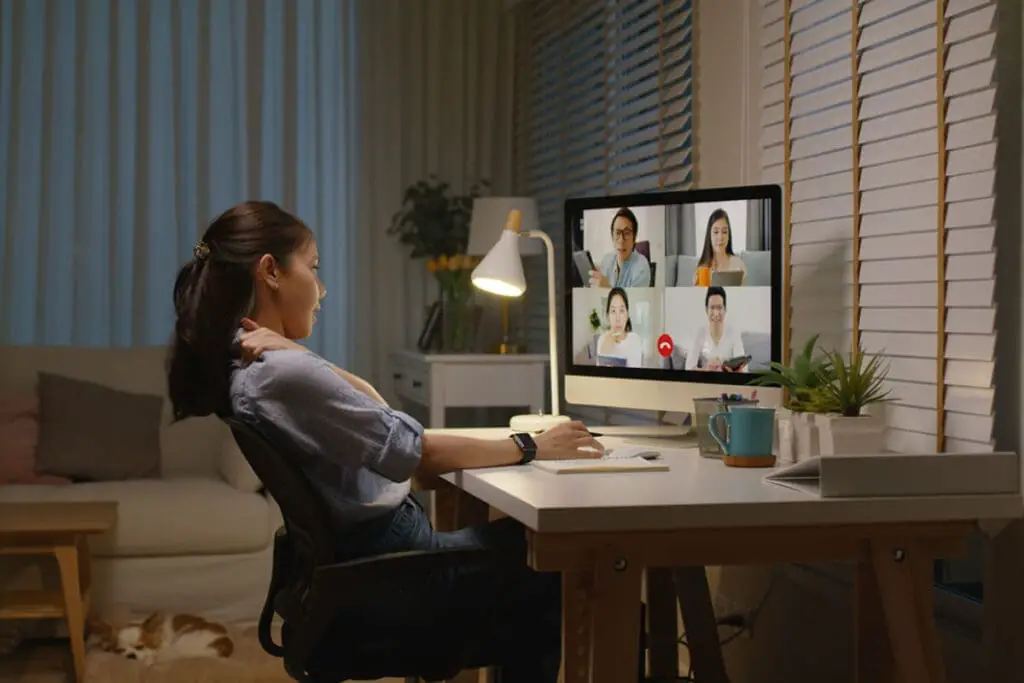After COVID ended, I asked my office in Vietnam and China if they wanted to continue remorse work, do a hybrid approach, or come back to the office. They all said we want and need to return to the office; I have found their response to be very different from what many feel in the Western world.
I believe relying solely on remote work for an extended period may not be a sustainable long-term strategy. Several factors underpin my concerns, highlighting this approach’s potential risks to workforces, especially in regions like the United States and the broader Western world.
Table of Contents
- 12 Challenges Of Remote Work And Why It Might Not Be Sustainable Long-term
- Discipline And Self-Motivation
- Balancing Family And Work
- Communication Challenges
- Missing Out On Office Environment
- Limited Social Interaction
- Reduced Mentorship And Networking Opportunities
- Home Distractions
- Technological Challenges
- Your Work Could Be Moved Offshore
- Feeling Isolated
- Lack Of Work-Life Separation
- AI Is Changing Work
- 10 Tips for Successful Remote Work
- Frequently Asked Questions
- Related Content
12 Challenges Of Remote Work And Why It Might Not Be Sustainable Long-term
The rise of remote work has been transformative and challenging for the modern workforce. While it offers unparalleled flexibility and work-life integration, it has its fair share of difficulties.
Read one as we will explore twelve reasons remote work can be challenging and why it may not be as effective as some claim, especially in the long term.
Discipline And Self-Motivation
Remote work requires self-discipline and motivation, as employees must manage their time effectively and avoid distractions.
It requires you to set a time or place aside and say that is where I will work. I will get up and work every day from this time to this time. It is a hard disciple for many people as they can become easily distracted.

Balancing Family And Work
Working from home can blur the lines between personal and professional life, making setting clear boundaries and finding uninterrupted work time challenging.
I have been amazed as I have heard of how many people will babysit their kids or grandkids while working. I do not see how you can babysit for a 4-year-old if you also work. You have to keep an eye open for the four years old and, at the same time, try to concentrate on your work; something or someone is going to lose out, and it is probably going to be the work,
Communication Challenges
Remote workers may face difficulties quickly and easily communicating with colleagues, resulting in potential miscommunications and delayed responses.
Besides that, you can miss out on a lot of nonverbal communication, which is also an important.t part of communication.
Missing Out On Office Environment
In a remote setting, employees miss out on spontaneous interactions, impromptu brainstorming sessions, and the camaraderie that an office environment fosters.
Things that can happen in the office, especially in a large company, can be vital that you will miss out on or be the last to hear about.

Limited Social Interaction
The social aspect of work, such as sharing lunch, office celebrations, and water cooler chats, is crucial for building strong team bonds and maintaining employee morale.
It can also help you to know what is going on, especially in larger organizations,
Reduced Mentorship And Networking Opportunities
Remote workers may miss out on valuable mentorship and networking opportunities often arising from face-to-face interactions with colleagues and superiors.
That is why if you are a young worker just out of college, you should want to go into the office as it will help you with mentorship and networking.
Home Distractions
It can be challenging to maintain focus at home, especially if family members, pets, or other distractions are nearby.
Maybe you will think I will just put my laundry in now, and then you think, I need to take that laundry out. All these distractions can add up to a lot of wasted time.
Technological Challenges
Technical issues such as unstable internet connections or malfunctioning equipment can disrupt productivity and cause frustration.
Depending on where you live, this can be a constant challenge for you.

Your Work Could Be Moved Offshore
If workers insist on working remotely, many companies can say we might as well have all remote workers, and jobs could be moved offshore more easily to places like the Philippines, India, and Africa.
All of these locations are starting to do more with remote work, so workers that insist on working remotely may find their job is the first to go offshore.
Feeling Isolated
Some remote workers may experience feelings of isolation and disconnection from their team, negatively impacting their mental well-being.

Lack Of Work-Life Separation
Paradoxically, while remote work offers flexibility, it can also lead to an “always-on” culture, where employees find it challenging to switch off from work, resulting in burnout.
AI Is Changing Work
AI or Artificial intelligence is changing work and how we work. Those who work remotely may find that their jobs are some of the first to go due to AI, as companies will work and look at ways to replace those jobs. People who want to keep their jobs should want to be in the office to keep on top of these developments.
Remote work undoubtedly has its merits, but it isn’t easy. From the need for self-discipline and balancing family life to communication challenges and the lack of social interaction, remote work can be demanding.
To ensure its long-term sustainability, companies must address these challenges by implementing effective communication strategies, providing remote support systems, and promoting work-life balance for their remote workforce. Hybrid approaches that combine the best remote and in-person work may ultimately offer a more balanced and sustainable solution for the future of work.
10 Tips for Successful Remote Work
In recent years, remote work has become increasingly popular, offering flexibility and convenience for employees and employers alike. However, the shift to remote work comes with its own set of challenges. To ensure that you’re doing your best work while working remotely, here are 10 essential tips to help you stay productive, engaged, and effective.
Turn on the Camera
Video meetings have become the new norm for remote work, and they offer a great opportunity for face-to-face interaction, even if it’s virtual. Turning on your camera during meetings helps you stay engaged, make a stronger connection with your colleagues, and ensure you’re actively participating in discussions.
Be Punctual
Just like you would in the office, be on time for meetings and work tasks. Punctuality demonstrates professionalism and respect for your colleagues’ time. Set reminders, use calendars, and manage your schedule effectively to avoid unnecessary delays.
Create a Dedicated Workspace
Working from your kitchen table or your couch can be tempting, but it’s essential to establish a dedicated workspace. A proper workspace helps you mentally separate work from home life and can boost your focus and productivity.
Stick to a Routine
Maintain a consistent daily routine that aligns with your work hours. Wake up at the same time each day, get dressed as if you were going to the office, and follow a structured schedule. This routine helps signal your brain that it’s time to work.
Minimize Distractions:
Identify common distractions in your home and find ways to minimize them. Turn off social media notifications, create quiet hours if you have a noisy household, and set boundaries with family or roommates to ensure uninterrupted work time.
Take Regular Breaks
Avoid burnout by scheduling short breaks throughout your workday. Stand up, stretch, or take a walk to recharge. Breaks can boost your productivity and creativity.
Communicate Effectively
Clear communication is crucial when working remotely. Keep your team updated on your progress, ask questions when needed, and proactively share information. Use tools like chat, email, and project management platforms to stay connected.
Set Goals and Prioritize Tasks:
Define clear goals and prioritize your tasks. This helps you stay organized and ensures that you’re focusing on the most important work. Consider using task management apps to keep track of your to-do list.
Invest in Professional Development
Remote work provides an opportunity to expand your skill set. Take advantage of online courses, webinars, and resources to enhance your knowledge and stay competitive in your field.
Maintain Work-Life Balance
It can be easy to overwork when your home is your office. Set boundaries between work and personal life. When your workday is over, disconnect from work-related tasks, and spend quality time with your loved ones or engage in hobbies and activities you enjoy.
Remote work offers numerous advantages, but it requires discipline and effective strategies to succeed. By following these 10 tips, you can ensure that you’re doing your best work, maintaining a healthy work-life balance, and thriving in a remote work environment. Remember, remote work is about finding a balance that works for you and allows you to be productive and fulfilled in your career.
Find out more about how Mondoro can help you create, develop, and manufacture excellent home decor and furniture products – don’t hesitate to contact me, Anita. Check out my email by clicking here or become a part of our community and join our newsletter by clicking here.
Mondoro gives out a FREE Lookbook to anyone interested. You can receive a copy of our latest Lookbook by clicking here.
Listen to our Podcast called Global Trade Gal. You can find it on all major podcast platforms. Try out to listen to one of our podcasts by clicking here.
Subscribe to our Mondoro Company Limited YouTube Channel filled with great videos and information by clicking here.
Frequently Asked Questions
Why is remote work a concern for the long term?
Remote work may not be sustainable because of various challenges that can impact the productivity, well-being, and collaboration of employees, particularly in regions like the United States and the broader Western world.
What are the primary challenges associated with remote work?
Challenges include potential communication barriers, decreased team cohesion, difficulty in maintaining work-life balance, and the impact on mental health due to isolation.
How does remote work affect collaboration among team members?
Remote work can hinder spontaneous interactions, impeding the natural flow of collaboration that occurs in an office environment. This may lead to delays in decision-making and project execution.
Is there a risk of decreased employee engagement with prolonged remote work?
Yes, extended remote work may lead to reduced employee engagement, as employees may feel disconnected from their colleagues and the overall company culture.
How does remote work impact work-life balance?
Remote work can blur the boundaries between professional and personal life, making it challenging for employees to establish clear boundaries and maintain a healthy work-life balance.
What role does cultural difference play in the perception of remote work?
Cultural differences may influence employees’ preferences regarding remote work. In some regions, like Vietnam and China, there might be a stronger desire to return to the office for better collaboration and teamwork.
Are there specific industries more affected by the challenges of remote work?
Industries that heavily rely on face-to-face interactions, creative brainstorming, or physical presence, such as certain aspects of manufacturing or research and development, may find remote work less sustainable.
How does remote work impact employee mental health?
Prolonged remote work can contribute to feelings of isolation, loneliness, and stress, affecting the mental health of employees. Lack of social interaction and support systems can exacerbate these issues.
Are there concerns about the long-term impact on career advancement in remote work?
Remote work may pose challenges for career advancement as employees may miss out on networking opportunities, mentorship, and visibility within the organization that come more naturally in an office setting.
Can a hybrid approach be a solution to the challenges of remote work?
A hybrid approach, combining remote and in-office work, is seen by some as a potential solution to balance flexibility and collaboration. However, finding the right balance and addressing logistical challenges is crucial for its success.
Related Content
Don’t Confuse Activity With Productivity & Other Myths
Being busy or having a lot of activities and things to do is not the same thing as productivity. Productivity is when you do those activities and things that help you focus on the company’s growth. Busyness or being busy is not the same thing as being productive.
You can discover more by reading Don’t Confuse Activity With Productivity & Other Myths by clicking here.
What Is Quietly Quitting? 8 Reasons Why It Is a Bad Idea
Quietly quitting is when workers decide to do no more than what is required. They decide that they will do the bare minimum. Quietly quitting started in China and was known as “lying down.” We do not believe “quietly quitting” is a good idea since it hurts the employee or the employer – both get hurt by this behavior.
You can discover more by reading What Is Quietly Quitting? 8 Reasons Why It Is a Bad Idea by clicking here.
8 Reasons Productivity Makes You Happy
There are many ways that productivity can help to make you happy. Studies have shown that some of the most productive people are also the most content. Productive people accomplish things, learn new things, achieve goals, and do the other things in life that help ensure they are effective and happy. The good news is that productivity can help to make you happy.
By clicking here, you can discover more by reading 8 Reasons Productivity Makes You Happy.


